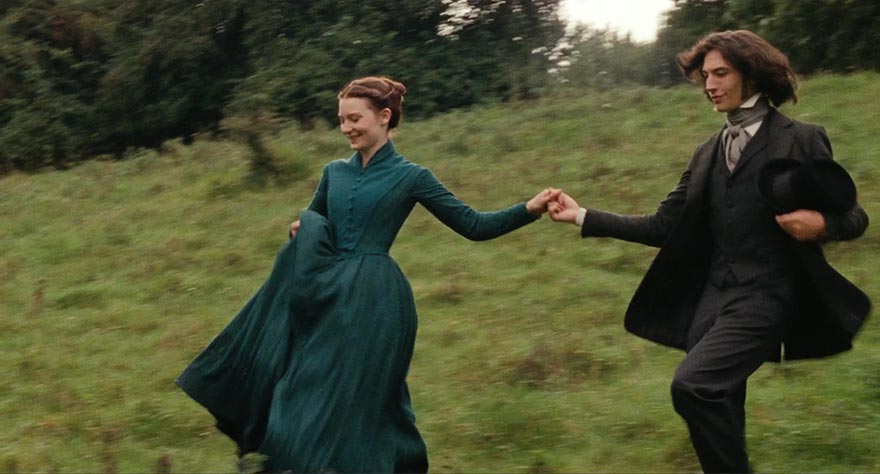
A restless and unnecessary adaptation that manages to flatten an already overplayed tale.

A restless and unnecessary adaptation that manages to flatten an already overplayed tale.
This is certainly not the first so-called movie rodeo for Gustave Flaubert’s 1856 novel Madame Bovary. The somewhat scandalous (at publication) realist novel has seen many film iterations. Sophie Barthes directs this latest attempt, written by first-timer Rose Barreneche (née Felipe Marino), and it’s rather a wonder that anyone felt that, one, what the world was lacking at the moment is another Madame Bovary adaptation, or two, that quite so much money and talent should be thrown into it. Considering the entire nature of the realism movement—gritty and hard perspectives on those in difficult or lowly situations, meant to show the truth of the human condition—this Madame Bovary is flat and unassertive.
By now Mia Wasikowska must be permanently corset-shaped. She has so many period-set films under her tiny belt. And more to come with this fall’s Crimson Peak . In Madame Bovary she is given some especially detailed, colorful, and decadent dresses to wear over those corsets, and the costuming of this otherwise droll film is quite possibly its most shining feature. But I digress, because despite the dated material they are given to work with, the performances of the film are quite strong. Wasikowska plays the Madame, Emma, who, at a young age, marries a country doctor, Charles Bovary (Henry Lloyd-Hughes) who loves her in an earnest, boring sort of way. Book-read and sheltered away in a convent school for years, Emma, finds married life to be more provincial then she perhaps anticipated. The more she learns of her unambitious husband, the more she finds herself easily distracted by the young law student Leon Dupuis (Ezra Miller looking distractingly pretty) who has captured her attention with his romantic notions and traveled experiences. When he declares his attraction to her, she rejects him but immediately laments that he leaves town.
Determined not to spend the rest of her life passionless, Emma is much more eager to engage in scandal when her next suitor comes calling. The Marquis (Logan Marshall-Green) is rich and red-blooded. They begin a steamy affair as Emma grows bolder, and yet more prone to escapism. With the help of smooth salesman Monsieur Lheureux (Rhys Ifans practically stealing the show), Emma misplaces her ambition into worldly decadence, filling her home with fancy home furnishings her husband can never dream to afford. But being the pushover he is, Charles remains oblivious to his wife’s misdemeanors and their growing debt. Meanwhile, Emma’s life plays out like a sad version of Goldilocks and the Three Bears. She tries out Charles (clarly a Mama bear) and he’s too soft. So she moves on to The Marquis (a definitive Papa bear) and he’s much too hard, leaving her broken. Finally she returns to Leon (whose baby-face isn’t the only thing defining him as Baby bear) and he is just right. But this is a morality tale, and we all know things don’t work out for Goldilocks. She needs to respect other animal’s property, and Emma needs to stop living in the 21st century when she’s clearly stuck in the 19th.
As is the case with many of these 19th century realist novels, the translation to film can be a bit drab. Mostly because the sorrows of the poor characters of the 19th century, rather than evoke sympathy in their plight, are often portrayed so pathetically, it rather feels like watching The Real Housewives of 19th Century Rural France. And in that world, no one gets a happy ending. Like last year’s In Secret, the adaptation of Émile Zola’s naturalist novel, cheaters (as justified as they may be) just don’t win. I won’t ruin the ending, though there’s so many version of this story floating around I doubt there are many of you out there who can’t guess. Interestingly enough Anne Fontaine’s Gemma Bovery is out now as well and is garnering positive reviews.
Barthes is an interesting choice of director, her most notable feature before this being the Paul Giamatti film Cold Souls. Which provides some explanation for his small role in Madame Bovary. The cinematography is reminiscent of Joe Wright’s Pride & Prejudice, minus the lens flares and warmth. Plenty of widely framed shots of the dreary French country-side. Emma in her colorful clothing shines among the blandness, but her smile-less face rather reminds us at all times of the film’s tone. Most puzzling is that Barthes chose to film so straightforwardly. There is very little deviation from the original story and yet no real emphasis on the naturalist/realist style of the novel. It all plays out with a restless predictability.
Considering the caliber of the ingredients—A-list actors, tried and tested content, gorgeous costumery—Madame Bovary is unexceptional and bland. While female inequity and subjection is still a relevant issue, and one Barthes could have played with more, the portrayal of one woman’s sexual dalliances and shopping sprees is not exactly empowering or modern. Most consider Emma Bovary to be a romantic, caught up in her fantasies, but this rendition offers very little of that starry-eyed quality. Without any emotional connection, its hard to root for or cry for Emma Bovary. And when sex and shopping can’t even spark the slightest of interest for this female reviewer, it doesn’t bode well for extended audiences.